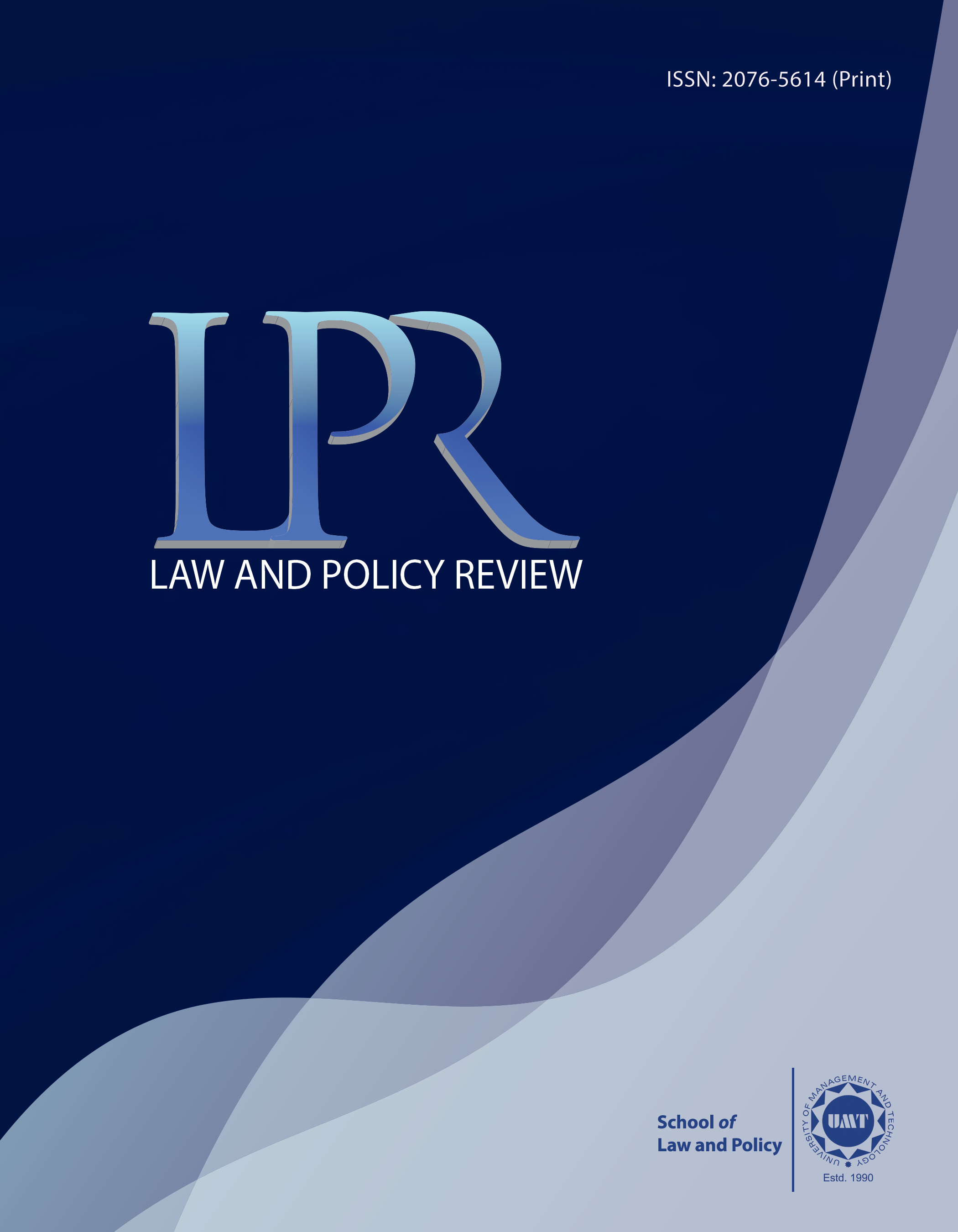Media Code of Conduct Violations: A Study on Mass Communication Education and Practice of Professional Ethics
Abstract
 Abstract Views: 0
Abstract Views: 0
This paper investigate the relationship between media code of conduct violations by television news channels' anchorpersons in Pakistan and their educational background, specifically comparing formal media graduates to non-media graduates. It also analyzes complaints lodged against 23 prominent news channels based on the data from Pakistan Electronic Media Regulatory Authority (PEMRA). The method of quantitative content analysis was applied on PEMRA complaints data for analysis. The results indicated 18 percent more tendency to violate media ethics among non-media graduate anchorpersons as compared to media graduate anchorpersons. Political bias and the dissemination of unverified content emerged as the most common complaints against both anchorpersons and news channels. The study suggests that a lack of understanding of relevant laws contributes to these violations, highlighting the need for legal education among media professionals. Furthermore, it identifies specific news channels that have received the highest number of complaints, including Kohinoor, Awaaz TV, and Samaa TV.
Downloads
References
Adeni, S., & Harahap, M. A. (2022). Social media ethics: Concepts and applications. In N. M. Ismail, A. H. Ummah & R. H. Chaniago (Eds.), Communication today (pp. 131–163). Syiah Kuala University Press.
Ahmad, A. (2022). Code of ethics for electronic media in Pakistan. Technium Social Sciences Journal, 29(1), 198–211. https://doi.org/10.47577/tssj.v29i1.1088
Ali, S. (2010). Where do ethics go in media? Journal of Media and Social Studies, 41 (3), 120–128.
Berg, K. T. (2022). A global perspective on ethics: New resources for teaching and discussing media ethics and journalism ethics. Journal of Media Ethics, 37(1), 72–75.
Brennen, B. S. (2021). Qualitative research methods for media studies. Routledge. https://doi.org/10.4324/9781003122388
Deane, J. (2015). Media and communication in governance: It’s time for a rethink. In A. Whaites, E. Gonzalez, S. Fyson & G. Teskey (Eds.), A Governance practitioner’s notebook: Alternative ideas and approaches (pp. 265–280). OECD.
Friend, C., & Singer, J. (2015). Online journalism ethics: Traditions and transitions. Routledge. https://doi.org/10.4324/9781315702025
Hafez, K. (2002). Journalism ethics revisited: A comparison of ethics codes in Europe, North Africa, the Middle East, and Muslim Asia. Political Communication, 19(2), 225–250. https://doi.org/10.1080/10584600252907461
Hamid, S., Bukhari, S., Ravana, S. D., Norman, A. A., & Ijab, M. T. (2016). Role of social media in information-seeking behaviour of international students: A systematic literature review. Aslib Journal of Information Management, 68(5), 643–666 https://doi.org/10.1108/AJIM-03-2016-0031
Gordon, A. D., Kittross, J. M., Merrill, J. C., Babcock, W., & Dorsher, M. (2012). Controversies in media ethics. Routledge.
Lunt, P. (2022). The reception of Goffman's work in media studies. In M. H. Jacobse & G. Smith (Eds.), The Routledge international handbook of Goffman studies (pp. 195–206). Routledge.
Mahmood, T. (2019). The reproduction of Pakistan through globalization, mediatization, and social networks (Publication No. 27528225) [Doctoral dissertation, North Carolina State University]. ProQuest Dissertations Publishing. https://www.proquest.com/openview/27 1295a3563213c4d4c847af9ddddf80/1?pq-origsite=gscholar&cbl=18750&diss=y
McPherson, T. (2009). Introduction: Media studies and the digital humanities. Cinema Journal, 48(2), 119–123.
Moreno, M. A., Goniu, N., Moreno, P. S., & Diekema, D. (2013). Ethics of social media research: Common concerns and practical considerations. Cyberpsychology, Behavior, and Social Networking, 16(9), 708–713. https://doi.org/10.1089/cyber.2012.0334
Mustafa, F., & Ameen, M. (2023). Semiotics and gender representation in Pakistani TVCs: Unraveling the hidden messages. VFAST Transactions on Education and Social Sciences, 11(2), 100–119.
Rozehnal, A. (2022). Digital media ethics. Law, Identity and Values, 2(1), 161–173. https://doi.org/10.55073/2022.1.161-173
Sajnani, D. K., Mahesar, A. R., Lakhan, A., & Jamali, I. A. (2018). Latency aware and service delay with task scheduling in mobile edge computing. Communications and Network, 10(4), 127–141. https://doi.org/10.4236/cn.2018.104011
Sajjad, M., & Jalil, J. A. (2018). News content on private tv channels in Pakistan: PEMRA standards and international best practices. Journal of Contemporary Studies, 7(1), 20–37.
Sarma, D. S., Jafri, S. H., Fletcher, I. R., & McNaughton, N. J. (2020). Constraints on the tectonic setting of the Andaman ophiolites, Bay of Bengal, India, from SHRIMP U-Pb zircon geochronology of plagiogranite. The Journal of Geology, 118(6), 691–697. http://hdl.handle.net/20.500.11937/5000
Sarwar, M. S., Haq, W. U., Shafiq, J., & Shahzad, K. (2020). Effect of political leaders’ televised uncivil language on society: Citizens’ following of negative and non-Islamic language. Al-Az̤vā, 35(54), 59–68. https://doi.org/10.51506/al-adwa%20.v35i54.168
Sarwar, M. S., Haq, W. U., Shahzad, K., & Shafiq, J. (2020). Uncivil language of political leaders and voting patterns: Measuring the impact on youth voters during Pakistan general elections 2018. Journal of the Punjab University Historical Society, 33(1), 17–25.
Sarwar, M. S., Umber, S., & Bajwa, A. M. (2020). Effects of political polarization of media on contents credibility and consumers in Pakistan. Pakistan Social Science Review, 4(3), 599–609.
Sultan, K., Iqbal, A., Khalid, Z., & Ali, S. (2016). Media ethics and responsibility: analysis of GEO news and ARY news' coverage on Hamid Mir's Issue. Journal of Social Sciences, 225–249.
Watson, A., Lupton, D., & Michael, M. (2022). The presence and perceptibility of personal digital data: findings from a participant map drawing method. Visual Studies, 38(3–4) 594–607. https://doi.org/10.1080/1472586X.2022.2043774
Copyright (c) 2023 Muhammad Shabbir Sarwar, Muhammad Salman Shafiq, Javairia Shafiq, Fatima Sajjad

This work is licensed under a Creative Commons Attribution 4.0 International License.
LPR follow an open-access publishing policy and full text of all published articles is available free, immediately upon publication of an issue. The journal’s contents are published and distributed under the terms of the Creative Commons Attribution 4.0 International (CC-BY 4.0) license. Thus, the work submitted to the journal implies that it is original, unpublished work of the authors (neither published previously nor accepted/under consideration for publication elsewhere). On acceptance of a manuscript for publication, a corresponding author on the behalf of all co-authors of the manuscript will sign and submit a completed the Copyright and Author Consent Form.





